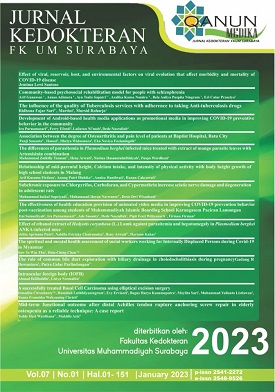The spiritual and mental health assessment of social workers working for Internally Displaced Persons during Covid-19 in Myanmar
Abstract
This study utilizes the spiritual assessment viewpoint to analyze the spirituality of social workers who are working for Internally Displaced Persons (IDPs) in Kachin and Northern Shan State, Myanmar where the working situation is stressful, and security is not guaranteed. The data is collected online during the pandemic and military coup, in April 2022. It is a quantitative research assessment and the form of Spirituality Assessment of Social Workers Working for IDPs (SASWWIDPs) is designed as three dimensions of SASWWIDPs: Healthy self-awareness (HSA), healthy relationship (HR), and healthy feeling (HF). The accumulated data is interpreted using SPSS 22.0 for statistical analysis. Most of the participants are female (66%) and 34% are male. The results of the three dimensions of the SASWWIDPs are different from their social characteristics: in gender, females’ HF in self-care and managing stress is higher than males (t=-3.21**). In terms of religion/faith, the group Buddhism’s HF is higher than Christianity on the benefits of religion in managing stress (t=-2.833**). Regarding working years, people who have been working for 2 years have a more positive mindset on their work than those for 3 years above in HSA (t=2.918**); in terms of age, there is no difference among the different age groups. However, both groups agree the role of friends and families is vital to overcoming challenges and stress.
Full text article
References
Badri, M., Khaili, M. A., Bahar, M. A., Yang, G., Reynhout, G., & Rashdi, A. A. (2021). Social
connection and self-perceived depression among adolescents: A path analytic model for
Abu Dhabi. Journal of Child and Family Studies, 30(1), 146–157.
https://doi.org/10.1007/s10826-020-01891-2
Brown, S. S. (2016). Intersections of race, spirituality, and domestic violence: The
counternarratives of African American women survivors.
https://www.proquest.com/docview/1886124077/DA59C0DF9AC445DFPQ/1?accountid
=8395
Dhami, M., Sharma, S., & Kang, T. K. (2021). A relational analysis of mental health and
spiritual intelligence among youth: A new paradigm. https://doi.org/ISSN-p-2229-4937,e-
-368X
Foster, S., & Wall, T. (2020). Good Health and Well-Being. Encyclopedia of the UN Sustainable
Development Goals. https://doi.org/10.1007/978-3-319-95681-7
Furness, S. (2016). Religion, spirituality, and social work. Spirituality across Disciplines:
Research and Practice:, 179-190. https://doi.org/10.1007/978-3-319-31380-1_14
Graff, D. L. (2007). A study of Baccalaureate social work students’ beliefs about the inclusion of
religious and spiritual content in social work. Journal of Social Work Education, 43(2),
-256. https://doi.org/10.5175/jswe.2007.200500526
Haleem, A., Javaid, M., & Vaishya, R. (2020). Effects of Covid-19 Pandemic in daily life.
Current Medicine Research and Practice, 10(2), 78-79.
https://doi.org/10.1016/j.cmrp.2020.03.011
Jankowski, P., Sandage, S., Crabtree, S., Wang, D., & Chin, E. (2022). The moderating influence
of religiousness/spirituality on Covid-19 impact and change in psychotherapy.
https://doi.org/10.3390/rel13060488
Loue, S. (2017). Handbook of Religion and Spirituality in Social Work Practice and Research.
Springer New York. https://doi.org/10.1007/978-1-4939-7039-1
Matos, M., McEwan, K., Kanovský, M., Halamová, J., Steindl, S. R., Ferreira, N., Linharelhos,
M., Rijo, D., Asano, K., Vilas, S. P., Márquez, M. G., Gregório, S., Brito-Pons, G.,
Lucena-Santos, P., Oliveira, M. da S., Souza, E. L. de, Llobenes, L., Gumiy, N., Costa,
M. I., & Habib, N. (2021). The role of social connection on the experience of COVID-19
related post-traumatic growth and stress. PLOS ONE, 16(12), e0261384.
https://doi.org/10.1371/journal.pone.0261384
Menon, S., & Bhagat, V. (2021). A review study on the impact of COVID-19 on mental health in
the workplace and on working people. Research Journal of Pharmacy and Technology,
–6731. https://doi.org/10.52711/0974-360x.2021.01162
Ozcan, O., Hoelterhoff, M., & Wylie, E. (2021). Faith and spirituality as a psychological coping
mechanism among female aid workers: a qualitative study. Journal of International
Humanitarian Action, 6(1). https://doi.org/10.1186/s41018-021-00100-z 7
Peltonen, T. (2017). Spirituality and Religion in Organizing. Springer International Publishing.
https://doi.org/10.1007/978-3-319-56312-1
ten Have, H., & Patrão Neves, M. do C. (2021). Spirituality. Dictionary of Global Bioethics,
-959. https://doi.org/10.1007/978-3-030-54161-3_473
The Guardian. (2021). Myanmar massacre: two save the children staff among dead. The
Guardian. https://www.theguardian.com/world/2021/dec/28/myanmar-massacre-twosave-the-children-staff-among-dead
Wolff, T. J. (2020). The Touristic Use of Ayahuasca in Peru. Expectations, Experiences,
Meanings and Subjective Effects. https://doi.org/10.1007/978-3-658-29373-4
Wane, N. N., Manyimo, E. L., & Ritskes, E. J. (2011). Spirituality, Education and Society: An
Integrated Approach. https://doi.org/ISBN 978-94-6091-603-8 (e-book)
Authors

Qanun Medika by FK UM Surabaya is liscence under Lisensi Creative Commons Atribusi 4.0 Internasional.

